Looking for the best baby formula for constipation that will ensure a comfortable and soft stool?
Do you need a product that will support your baby’s immune system and promote brain and social development?
To know how to deal with constipation in babies as well as to identify the best formula for constipation in babies, it is necessary to understand what the condition is.
In general terms, Constipation is a digestive issue that is characterized by compactness of stools and difficulty in passing the bowel movement.
The digestive problem does not refer to the frequency of bowel movement since the number and consistency of stool vary widely from one baby to another and according to age.
Quick Navigation
- How To Know Your Baby Is Constipated?
- Common Causes Of Constipation In Babies
- How To Treat Newborn Constipation?
- Which Is The Best Formula For Constipation?
The Most Recommended Formula For Constipation: 10 Best Reviewed
- Similac Advance Non-GMO Baby Formula For Constipation
- Kabrita Non-GMO Goat Milk Toddler Formula For Constipation
- Gerber Good Start Gentle Non-GMO Powder Formula For Constipation
- Culturelle Kids Packets Daily Probiotic Formula For Constipation
- Enfamil Reguline Infant Formula For Constipation
- Enfamil Reguline Infant Formula Reusable Powder For Constipation
- FloraTummys Probiotic Sprinkles Baby Formula For Constipation
- Infant Probiotics By Mother’s Select For Colic And Gas
- Probiotic & Prebiotic Digestive Supplement Complex Powder Formula For Constipation
- Enfamil Infant Non-GMO Baby Formula For Constipation
How To Know Your Baby Is Constipated
It is normal for babies to experience strain or difficulty when passing the bowel movement. One of the reasons for this is because they lie flat, a position in which the force of gravity cannot help the process.
It is important to understand and know when your baby is constipated. Only by doing this will you be in a position to take the necessary measures that will ensure that your baby is comfortable.
According to the research of BabyStrollerHome, Breastfed babies are likely to poop several times in a day, with the stool being soft and consistent. Formula-fed babies have fewer bowel movements that pass firmer and darker stools.
As a parent, spending time with your baby will allow you to get used to the color, regularity, and consistency of the baby’s bowel movement.
This means that you will notice in case the pattern changes.
To tell if your baby is constipated, you should look for several signs.
- Firm stools with straining in passing them for newborns is one of the major signs of constipation.
- Traces of blood on the stool and diaper may be a sign that the rectum was torn by compact stool.
- Dry and hard stools with the baby experiencing pain when passing them
- Abdominal discomfort, foul-smelling wind, and poop with offensive smell accompanied by hard and infrequent stools
- Hard, pebble-like stools with grunting, getting red-faced and lifting of legs to the abdomen when passing bowel movement.
- The baby may also cry when passing stool due to pain and discomfort.
If your baby exhibits signs such as lack of appetite, lethargy, fever, and vomiting, you should seek medical attention.
Common Causes of Constipation in Babies
While it is not common for a baby on an all-liquid diet to experience this digestive issue, there is a chance that it can happen.
In most cases, constipation occurs in formula-fed babies.
Constipation in children has some possible causes.
- Dehydration – when your baby is dehydrated, the body will seek to absorb the fluids it requires from whatever the baby eats or drinks. The body will also draw fluids from the waste in the baby’s bowels. The result will be a dry and hard stool that will be difficult to pass.
- Medical condition – although rarely, constipation in babies may indicate a digestive issue, metabolic problem, malformation of the anatomy or other medical conditions. Constipation can also be caused by food allergies and defects in the baby’s gut.
- Drinking too much milk – sometimes, drinking too much milk instead of high-fiber foods may result in constipation. This is why it is important to include enough fiber in the baby’s diet.
- Lack of activity – exercise, and movement facilitate the flow of blood to the digestive system, a factor that helps to reduce the chances of constipation. Children who are not active are more likely to experience trouble in bowel movement.
- Formula – one of the reasons why exclusive breastfeeding reduces the chances of constipation is because breast milk contains a perfect balance of proteins and fats. Once it has been digested, the waste will be a soft stool that passes easily from the body.
- Toilet training issues – children are likely to rebel when you begin toilet training before the right age. When this happens, your baby may rebel and voluntarily ignore the urge to poop. With time, this could become an involuntary habit that may result in constipation.
- Changes in routine – changes in the baby’s routine can have an effect on their bowel movement. Such changes include hot weather, travel, and stress. For instance, your baby is more likely to experience constipation on the first day of school or if they travel away from home.
- Family history – a child born in a family where other members experience constipation is likely to experience the digestive issues. Family history and constipation have been linked to genetic and environmental factors.
How To Treat Newborn Constipation
Identifying the reason why your baby experiences constipation will make it easy for you to treat the problem.
Based on the common causes of the condition, there are several steps that you can take to prevent and treat constipation.
- Increase the amount of fluid the baby takes – although water is the best fluid to give to your baby, you can also give them an apple or prune juice. Getting your child to drink at least 32 ounces of fluids other than milk will help to keep their stool soft.
- Massage the baby’s belly – before massaging the belly; you should measure three finger-widths below the navel. Make sure you apply gentle but firm pressure on the lower left side of the body using your fingertips. When you feel some firmness, maintain constant and gentle pressure for three minutes to ease constipation.
- Help the baby get some exercise – you should encourage your crawling baby to make more laps and pump the legs if the baby has not reached the crawling stage. You can also move the baby’s legs in the motion of pedaling a bicycle when they are lying on their back.
- Switch to a different baby formula – in case you feed your child baby formula; you should consider switching a different baby formula. However, you should ask your doctor about the best formula for constipation in babies.
- Cut down on constipating foods – one of the best ways to treat constipation is to cut down on foods such as bananas, rice, and cooked carrots. Before replacing these foods with high-fiber food, you should give the baby a belly massage.
- Consult the baby’s doctor on treatment options – if the baby is passing hard, dry stools with traces of blood, it is advisable to consult your pediatrician about the treatment options available.
The Most Recommended Formula For Constipation: 10 Best Formula For Constipation Reviews By Sujana Marie
There are some baby formulas that you can feed your baby to relieve or treat constipation.
Below are some of the best formula for constipation.
1) Similac Organic with A2 Milk Infant Formula, 6 Count, Gentle and Easy to Digest
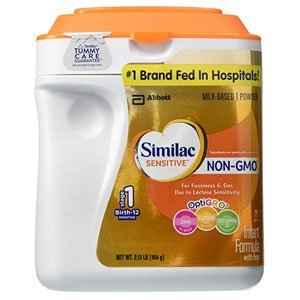
Similac Advance Non-GMO Baby Formula is a milk-based and iron-fortified infant formula powder that is designed to enhance the development of your baby’s brain and nourish their eyes.
As the name suggests, the baby formula is non-GMO, and the ingredients are not genetically engineered.
Similac Advance Baby formula features a variety of important ingredients that make up breast milk.
The ingredients are designed to boost the developing immune system of the baby and help in building strong muscles.
With the inclusion of ingredients found in breast milk, this is also a great formula for constipation.
[button url=”https://amzn.to/3EaNzsV”]
2) Kabrita Non-GMO Goat Milk Toddler Formula For Constipation
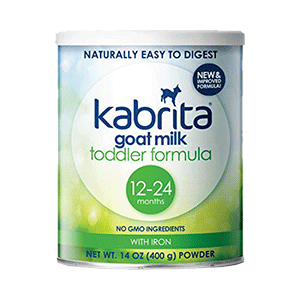
Being a premium, non-GMO goat milk toddler formula, Kabrita is naturally easy to digest.
This makes it a good alternative for children who are sensitive to cow milk since such sensitivity can cause eczema, colic, and constipation.
The fact that the baby formula is easy to digest means that it will go a long way in helping to avoid digestive issues.
In addition to having a mild and sweet taste and smell, the baby formula for constipation is effective and nutritious.
This feature makes it a great alternative to goat milk formula recipes made at home.
Kabrita baby formula contains a total of 22 vitamins, iron, and folic acid. It is also free from growth hormones, preservatives, and antibiotics.
[button url=”https://amzn.to/31eeLsJ”]
3) Gerber Good Start Gentle Non-GMO Powder Formula for Constipation
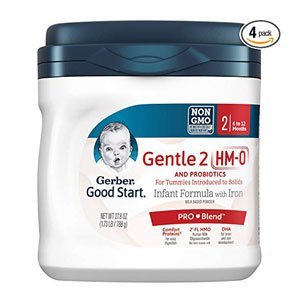
As your baby grows, their nutritional needs will change too. This makes it important to choose infant formula that will supply your baby’s growing nutritional needs.
Gerber Good Start Gentle Non-GMO Powder contains key nutrients such as Iron and Calcium, both of which your baby needs at every stage of development.
The formula contains comfort proteins that are gentle on the little tummy and developing the digestive system of your baby. This makes it easily digestible and produces a soft stool.
In addition to avoiding constipation, the baby formula powder is designed to ensure proper development of baby’s brain and eyes.
[button url=”https://amzn.to/3DeSpUS”]
4) Culturelle Kids Packets Daily Probiotic Formula for Constipation
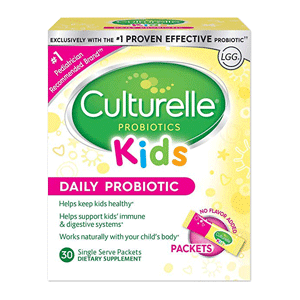
The baby formula is designed to include ingredients that will keep your baby happy and healthy as they grow.
Culturelle Kids also contains Lactobacillus GG, a bacterium that works naturally with the child’s body.
The bacterium also supports the immune system and promotes the digestive health of your baby.
By promoting the digestive health of your child, the baby formula reduces the occurrence of digestive upsets such as diarrhea and other sorts of discomfort.
The formula fosters the required balance of helpful bacteria in the child’s gastrointestinal tract, a factor that enhances the overall health of the baby.
[button url=”https://amzn.to/3D8DHyQ”]
5) Enfamil Reguline Infant Formula for Constipation
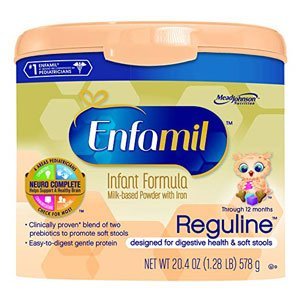
When your baby has a difficult time passing bowel movements, this everyday baby formula will help to promote comfortable and soft stools.
The prebiotic blend in the formula is responsible for soft stool while the proteins and complete blend of other nutrients ensure easy digestion.
All these benefits are aimed at supporting the digestive health of your child right from the time they are born to when they turn 12 months old.
With Enfamil Reguline Infant Formula, you will not only address stooling difficulty for your little one but will also provide complete nutrition and comfortable feeding.
[button url=”https://amzn.to/31gDPiz”]
6) Enfamil Reguline Infant Formula Reusable Powder Tub for Constipation
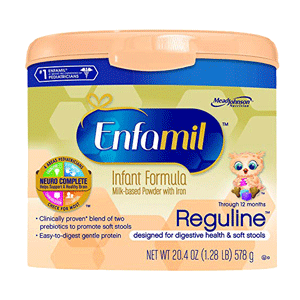
This milk-based, iron-supplemented infant formula features a unique blend of two prebiotics, a carbohydrate found in breast milk, easy to digest proteins, choline, and DHA.
These ingredients support the development of the brain, promote comfortable stools and provide complete nutrition for your baby.
Feeding baby Enfamil infant formula will also support the communication and social development of the child.
The everyday nutrition and easy to digest proteins contained in the formula help to eliminate digestive issues that could result in constipation.
Since it is a nutritional solution, your baby can use this product for as long as she uses formula, helping to achieve soft bowel movements.
[button url=”https://amzn.to/3D7bOXL”]
7) FloraTummys Probiotic Sprinkles Baby Formula for Constipation
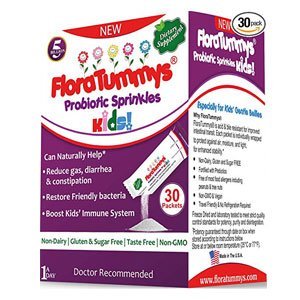
The dietary supplement is specifically made for kids. FloraTummys contains two important probiotic strains that doctors trust for the healthy growth and development of babies.
These strains are known to naturally restore to normal levels of human flora in the baby’s intestines.
The dietary supplement also contains a prebiotic whose purpose is to nourish the probiotics so that they are resistant to acids and bile produced in the stomach.
This helps to promote intestinal health for a long period. Feeding baby with this supplement will also help to reduce gas, diarrhea, and constipation.
[button url=”https://amzn.to/3pj7M9I”]
8) Infant Probiotics by Mother’s Select for Colic and Gas
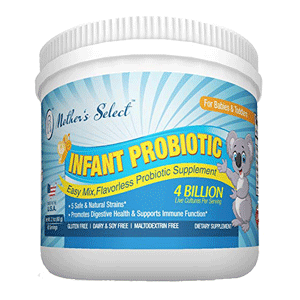
This flavorless probiotic supplement is safe and natural, with probiotics that mix easily with yogurt, juice, and formula.
One serving of the supplement contains up to 4 billion live cultures, all of which support your baby’s immune function and promote their digestive health.
The natural ingredients of Infant Probiotics ensure complete nutrition and proper development of babies between the ages of 6 months and 3 years.
As the name suggests, the natural and safe strains contained in the supplement will offer relief from colic and gas.
This will promote the overall comfort of your baby at all times.
[button url=”https://amzn.to/3D9XVYQ”]
9) Probiotic & Prebiotic Digestive Supplement Complex Powder Formula for Constipation
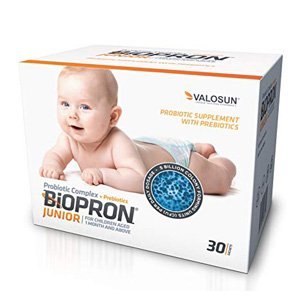
This product will produce the desired results if used with Biopron Drops right after the baby is born. The probiotics in the formula are designed to boost your baby’s immune system and to protect them when they are most vulnerable.
When your baby is taking antibiotics, the drugs will kill both harmful and helpful bacteria. The probiotics in the formula will help to naturally restore the good bacteria so that your child is protected from future illnesses.
This supplement is recommended for enhancing gastrointestinal health and providing relief from diarrhea, leaky gut, allergies, bloating and constipation.
[button url=”https://amzn.to/31n5q1C”]
10) Enfamil Infant Non-GMO Baby Formula for Constipation
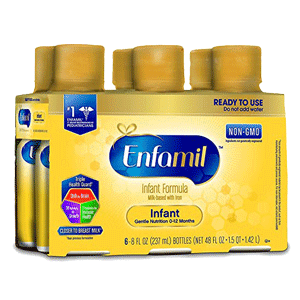
This complete nutrition baby formula is designed to meet the everyday nutritional needs of babies aged 0 to 12 months.
The formula is very close to mature breast milk, with important nutrients such as iron, choline, and DHA.
This feature makes it ideal for nourishing your baby’s brain. The infant formula will also help in eye development and promote a healthy immune system.
The non-GMO formula means that you can trust Enfamil to promote the development of your baby and relieve constipation in a safe way.
Feeding your baby the formula will also support physical milestones such as rolling over and grasping.
[button url=”https://amzn.to/3xHyFba”]
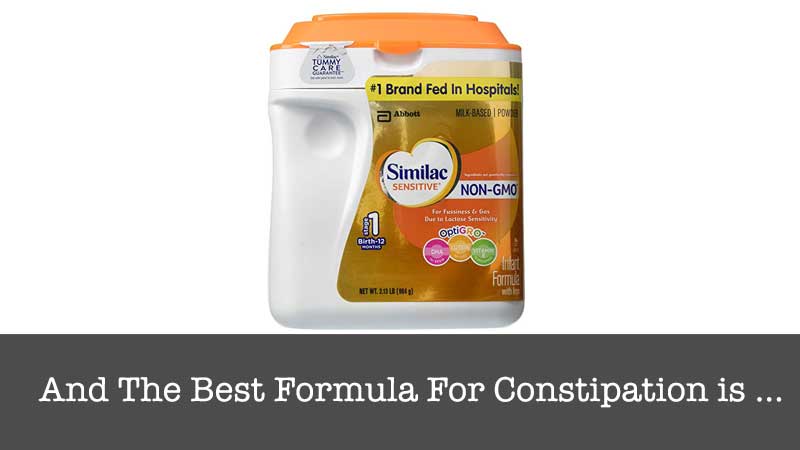
So, Which Is The Best Formula For Constipation?
It is the goal of every parent to ensure that their baby is comfortable and free from any medical conditions. Choosing the best formula for constipation in babies will give your baby a healthy start and promote overall development.

